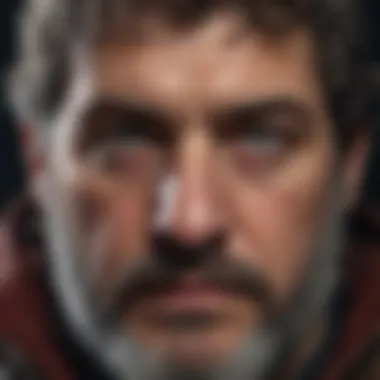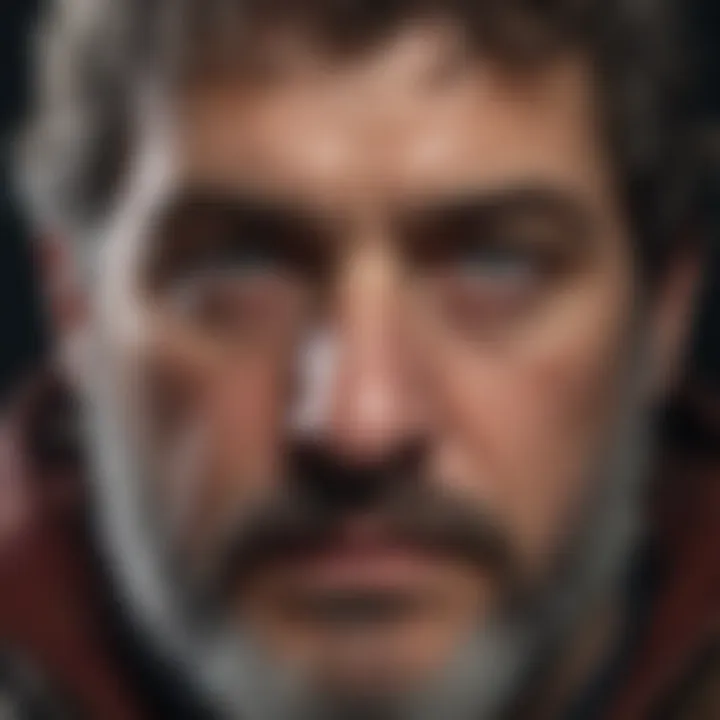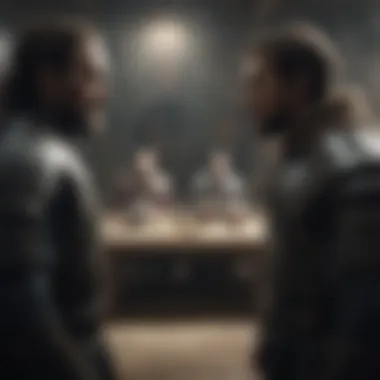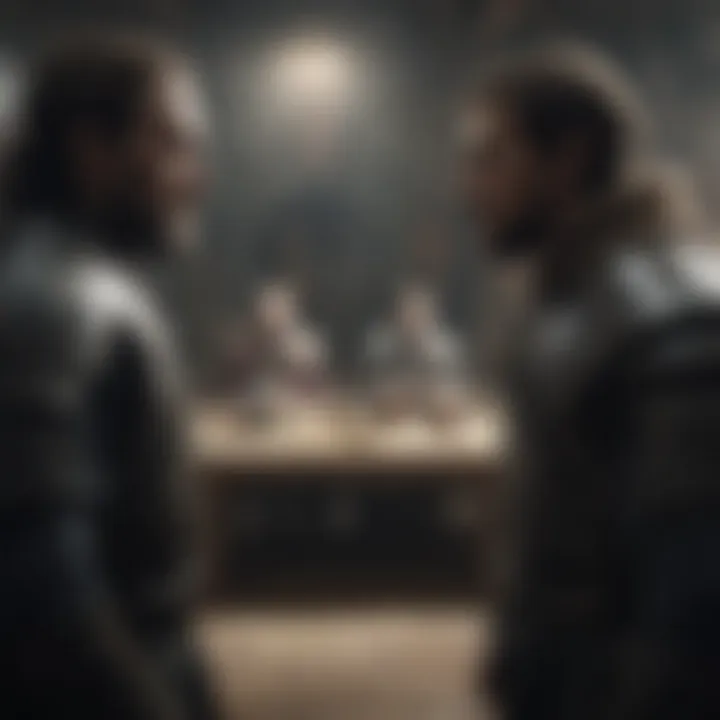A Thousand Eyes: The Observers of Westeros


Intro
The world of Westeros is rich with intricate plots and character dynamics that often hinge on the act of observation. In a land where power is frequently contested and allegiances shift like the seasons, the ability to see and understand the motives of others becomes a pivotal skill. Spies, scouts, and watchers play a crucial role in the unfolding drama, influencing events in ways that are both evident and subtle. This examination will explore how these observers impact the narrative through their actions and what it reveals about the nature of knowledge, power, and betrayal.
As we delve into these themes, we will look closely at the characters who embody the essence of observation, how their development shapes the overarching storyline, and the implications of their actions on the society around them. Each character, with their distinct qualities and motivations, serves as a lens through which we can understand the power dynamics at play in Westeros.
Character Dissections
Detailed Analysis of Key Characters in Game of Thrones
Within the realm of Game of Thrones, certain characters stand out as experts in observation and manipulation. Figures such as Petyr Baelish, also known as Littlefinger, serve as epitomes of the power of knowledge. Littlefinger, with his calculated schemes, shows how control of information can alter the course of events. His ascent from humble beginnings to a position of influence highlights the significant role of perception in the political landscape of Westeros.
Cersei Lannister, another pivotal character, uses her keen observation skills to navigate the treacherous waters of King's Landing. Her understanding of the motivations of those around her allows her to maintain a fragile grip on power in a largely male-dominated society. Through her journey, we can see how observation is often tied to survival and ambition.
Character Development Throughout the Series
Character growth throughout the series often reflects a deepening understanding of the power of observation. For instance, Sansa Stark evolves from a naive girl into a shrewd player in the political game. Her experiences teach her about the importance of watching and learning from others. This transformation showcases the theme that those who observe carefully often wield the greatest power.
Conversely, characters like Eddard Stark illustrate the dangers of being oblivious to the forces manipulating events behind the scenes. Ned's tragic fate underscores the necessity of observation in a world rife with deceit.
Impact on the Overarching Storyline
The actions and decisions of these observers directly shape the series’ main events, exemplifying how knowledge can lead to both triumph and ruin. From strategic alliances to betrayals that alter power balances, the significance of these characters cannot be overstated. Littlefinger's machinations lead to conflicts that resonate throughout the series, while Cersei's manipulations craft a narrative of intrigue and peril that captivates audiences.
"The man who passes the sentence should swing the sword" - Eddard Stark, highlighting the essential connection between power, responsibility, and observation.
As we continue to explore the layers of observation in Westeros, it becomes clear that every character has a unique relationship with knowledge and perception. Their narratives weave into the larger tapestry of the series, making the act of observation not just a tool, but a fundamental theme in understanding the complexities of power that define this world.
Prelims
The theme of observation is critical in the narrative of Game of Thrones, exploring how watching and understanding shape the world of Westeros. This article investigates this multifaceted concept of observation, highlighting its implications for power dynamics, interpersonal relationships, and societal structures within the series.
In a land where information is currency, the act of observing can determine the fate of kingdoms and individuals. Understanding the role of observers, such as spies and seers, reveals the intricate layers of trust and betrayal that pervade the story. These observations are not just passive acts but active engagements that influence decisions and outcomes. The importance of knowledge acquired through observation cannot be overstated, as it often leads to manipulation or protection.
Moreover, the concept of observation transcends mere surveillance. It encompasses the intricacies of perception in the context of politics and personal ambitions. This provides a dual lens for viewing events, as a character's perspective can color the options available to them, leading to both strategic advantages and miscalculations.
This exploration is especially relevant for fans of the series, as it sheds light on key figures like Petyr Baelish and Varys, whose lives revolve around information.
"In the game of thrones, you win or you die. There is no middle ground." - Cersei Lannister
Ultimately, this article serves as a guide to understanding how observation is woven into the fabric of Game of Thrones, allowing readers to appreciate the narrative depth and the stakes involved in each character's actions. By delving into the nuances of observation, we can recognize its role in shaping plot developments and character arcs within this complex universe.
The Nature of Observation in Westeros
Observation plays a pivotal role within the Game of Thrones universe. In a land riddled with conflicts and power struggles, those who perceive the movements and intentions of others often hold the reins of authority. This aspect of observation is not merely a function of seeing events unfold, but involves understanding the motivations, relationships, and hidden agendas of various characters. It shapes political landscapes and affects outcomes in significant ways.
The ability to observe, interpret, and act on the information gleaned is essential for survival. Characters that master the art of observation can manipulate situations to their advantage. This creates an intricate web of knowledge where power resides with those who can best decode the signals around them.
Understanding the Landscape
To grasp the nature of observation in Westeros, one must first understand the sociopolitical landscape of this world. The Seven Kingdoms are characterized by a rigid class structure, hereditary rule, and constant threats both from within and outside. Each castle and stronghold serves as a vantage point, allowing observers to witness the movements of enemy forces or the machinations of rival houses.
The geography of Westeros also contributes to the dynamics of observation. For instance, the towering walls of Winterfell or the high perch of the Eyrie symbolize power, while also serving as literal platforms from which information is gathered. Characters like Sansa Stark and Petyr Baelish use their locations not just for defense but for strategic observation, understanding allies and foes alike.
Moreover, 'the North remembers' reflects a culture deeply aware of its history and surroundings. The inhabitants, having lived through betrayal and strife, excel in observation as a means of ensuring their survival.


The Intricacies of Perception
Perception, rather than mere observation, adds depth to the narrative of Game of Thrones. The act of observing is largely influenced by personal biases, past experiences, and inherent beliefs of the observer. These factors skew understanding and can lead to misinterpretations, sometimes with dire consequences.
For example, Eddard Stark’s honorable nature often clouds his perception of others’ motivations, blind to the subtle deceptions that surround him. In contrast, characters like Cersei Lannister possess astute observation skills combined with a willingness to exploit them ruthlessly. This contradiction highlights that what is perceived can vary greatly, even among skilled observers.
Understanding perception is crucial for characters seeking to maintain or gain power. They must navigate complex social landscapes where truths are often distorted. An observer must also read between the lines, understanding that actions may conceal deeper intentions or levers of power.
Key Observers in the Series
The role of observers in the Game of Thrones series carries a profound significance. These key figures shape the narrative through their unique perspectives and actions, reflecting the complex nature of power and information in Westeros. Understanding these observers provides insight into the game of thrones itself, revealing how knowledge can be wielded as a weapon and how perception can be manipulated.
The importance of these characters is not merely in their physical observations, but in their strategic uses of information to gain and maintain power. Each observer offers a different lens through which the audience can analyze events, decisions, and consequences that affect the realm. This section highlights three pivotal characters who embody the theme of observation: Littlefinger, Varys, and Bran Stark.
Littlefinger: The Master Manipulator
Petyr Baelish, commonly known as Littlefinger, is perhaps the most cunning observer in Westeros. His ability to gather and utilize information puts him in a unique position within the power dynamics of the realm. Littlefinger operates mostly in shadows, relying on whispers and rumors that travel quickly among the noble families. By positioning himself as an intermediary, he turns the flow of information to his advantage.
Littlefinger's manipulation of key events showcases how his observations shape outcomes. He exploits the weaknesses and ambitions of others, often leading them down paths of self-destruction.
- He sees potential in the chaos around him and strategically positions himself to benefit.
- Littlefinger's infamous advice to "Chaos isn't a pit. Chaos is a ladder" illustrates his belief that through careful observation, he can ascend the social order, using disorder to foster his ambitions.
Varys: The Spider’s Network
In contrast to Littlefinger, Varys, known as the Spider, emphasizes a more expansive network of information gathering. His role as a spymaster exemplifies the intricate web of alliances, loyalties, and betrayals in Westeros. Varys operates with a degree of moral ambiguity, believing that the good of the realm sometimes justifies his clandestine actions.
His methods of information collection involve a plethora of informants and spies across the Seven Kingdoms. Varys’s oft-repeated phrase, "Power resides where men believe it resides," encapsulates his understanding of perceived power.
- This understanding allows him to maneuver delicately through political landscapes, adjusting his strategies based on the evolving situation.
- His interactions with major players, such as Daenerys Targaryen and Tyrion Lannister, reveal how he uses his intelligence to support what he believes to be the realm's best interest.
Bran Stark: The Seer
Bran Stark represents a different dimension of observation—one that transcends ordinary human experience. After becoming the Three-Eyed Raven, Bran gains the power of foresight and the ability to observe past events. His visions contribute to the understanding of crucial events leading up to the climactic struggles faced by Westeros.
Bran's character brings forth the idea of destiny versus choice. He watches critical moments in history and gains insights that could change the course of future events.
- His observations are not just passive; they carry grave implications for the world around him.
- Bran's realization that he needs to share this knowledge demonstrates the burden of observation and the responsibility that comes with it.
Spies and Informants
The world of Westeros is fraught with danger, power struggles, and shifting loyalties. In this chaotic environment, spies and informants play a crucial role. They serve as the eyes and ears of powerful figures, providing valuable intelligence that can influence decisions and shape events. Understanding this theme is vital as it uncovers the hidden layers of the narrative, revealing how perception and information dictate the course of the realm. The use of espionage not only determines the fate of individuals but also the very fabric of society. Therefore, a detailed examination of spies and informants is essential in analyzing the complex dynamics at play in this fictional world.
The Role of Spying in Political Strategy
Spying holds a strategic position within the political machinations of Westeros. It provides insight into the motives and plans of rivals, enabling leaders to preemptively act or to exploit weaknesses. Characters like Varys and Littlefinger embody this approach, using their extensive networks to gain intelligence. Their mastery of information gathering allows them to navigate treacherous waters, often staying one step ahead of their enemies.
The primary benefits of employing spies include:
- Informed Decision Making: Leaders can make choices based on accurate data, rather than on speculation, reducing the risks associated with political maneuvers.
- Strategic Advantage: Knowledge of opponents’ schemes can offer crucial advantages in battles and negotiations.
- Influencing Public Perception: Spies can also manipulate information to create certain narratives about political rivals, leading to shifts in how the public perceives events or individuals.
Yet, this reliance on espionage does not come without its risks. Betrayal is a constant threat. Finding out a spy is double-crossing you can lead to disaster. Therefore, those engaged in this dark art must tread carefully, weighing the benefits against the potential fallout of discovery.
Notable Espionage Activities
Throughout Game of Thrones, various espionage activities stand out, demonstrating the intricate web of alliances and deceit.
- Varys’s Information Network: Varys, known as the Spider, utilizes a vast network of whispers and informants. He collects details for power players across the land, allowing him to make critical decisions with the knowledge that is rarely available to others.
- Littlefinger’s Manipulations: Petyr Baelish, aka Littlefinger, often engages in espionage not just to gather information, but to create chaos. He influences the noble houses by planting ideas and orchestrating events that serve his purpose.
- Cersei’s Espionage: Cersei Lannister also utilizes spies to keep tabs on her enemies. Her ability to gather information enhances her control over the Iron Throne, making her a formidable player in the game of thrones.


These activities illustrate that espionage is more than just gathering intelligence. It is a means of wielding power and influence over others, capable of altering the course of history in Westeros.
"Knowledge is power, and in Westeros, it can shift at a moment's notice."
Visual Symbols of Observation
The realm of Westeros is rich in imagery and motifs that signal deeper meanings related to observation. Visual symbols serve as conduits for understanding the intricate dynamics of power and perception. They weave into the narrative, layering complexity to the socio-political landscape. In this section, we will explore the two core symbols: the eye and the raven. Each holds substantial weight in the series, illustrating how they contribute to the overarching theme of surveillance and awareness.
The Eye Symbolism
Eyes hold significant value across various cultures, and in Westeros, they embody more than mere sight. The eye represents perception, truth, and the dire consequences of being watched. Key characters often engage in machinations while keeping their eyes peeled for opportunities, revealing a nuanced relationship with this symbol.
Characters like Varys and Littlefinger utilize this imagery effectively. Their actions show how perception is always at play. They leverage knowledge gained through observation to orchestrate events in their favor. The eye is also a reminder of a deeper philosophical notion into the nature of truth. What one sees may not reflect reality, and this multiplicity further complicates characters' judgment.
"The eyes are the window to the soul" becomes a potent theme. In Westeros, however, they also serve as doors to manipulation. Characters like Cersei Lannister exemplify this duality. She constantly observes her surroundings, as deceit runs rampant in King’s Landing. Cersei's careful scrutiny of rivals positions her strategically, yet it also reveals her emotional vulnerabilities.
- Key points on eye symbolism:
- Represents perception and truth.
- Reflects the observer's intentions, revealing the nature of manipulation.
- Highlights the consequences of misinterpretation.
As such, the eye emerges as a central motif throughout the series. It reiterates that knowledge provides power, but the meaning of that power can be subjective.
The Role of Ravens
Ravens are another compelling symbol within the realm of observation in Westeros. These creatures carry messages, often functioning as the eyes of those who cannot be physically present. They fly across distances, connecting far-flung locations and serving those who wield them. The ability to send messages through ravens symbolizes the extension of observation beyond immediate surroundings.
Ravens also introduce an ominous feel. Their presence often foreshadows events or reveals critical information. For instance, the use of ravens to deliver messages can alter political landscapes drastically. Consider how various characters utilize them. Varys employs his birds to gather information about plots against him while also ensuring that he remains elusive.
Their role in the series is not only functional but also deeply symbolic. The message carried by a raven can change allegiances and expose treachery. The act of sending a raven signifies not just communication but a tactic for controlling the narrative.
- Key points on the role of ravens:
- Act as messengers, bridging gaps between characters.
- They embody the element of control through information dissemination.
- Signifies foreboding; often indicates that change is forthcoming.
In summary, the visual symbols of observation in Westeros, particularly the eye and the raven, drive home the core themes of knowledge, power, and the complexities of perception. They serve as reminders that observation is not passive but deeply intertwined with the fate of many characters, emphasizing the stakes at play in every glance and message.
The Consequences of Observation
Observation in the world of Westeros is not merely an act of seeing. It holds significant weight in the unfolding of events, decisions made by characters, and the shifting dynamics of power. The consequences of observation manifest through the actions and choices that often lead to unpredictable and sometimes tragic outcomes. Understanding this topic is crucial, as it highlights the delicate balance between knowledge and influence.
Power Dynamics and Betrayal
In Westeros, power is often tied directly to what one witnesses. The characters who hold information possess an advantage over others. This advantage can sow seeds of betrayal, as allegiances shift based on newfound knowledge. For example, Littlefinger often uses the insight he gains from observing the interactions of others to manipulate situations to his favor. His understanding of power dynamics allows him to exploit relationships, leading to betrayal rooted in personal gain.
Furthermore, observation often leads to paranoia among characters. When individuals realize they are being watched, their actions become more calculated. The Iron Throne itself is a symbol of power, but it also represents vulnerability. Characters like Cersei Lannister experience acute anxiety due to their need to constantly watch for potential threats from their surroundings.
Betrayal is not only a plot device but also a consequence of observation. Knowledge is a double-edged sword. In moments of power struggles, trust erodes rapidly as characters utilize what they know against one another. This creates a culture of suspicion, making it difficult for final alliances to hold.
"To know, is to be powerful; to be watched, is to be vulnerable."
Psychological Impacts on Characters
The psychological ramifications of observation run deep in the psyche of Westeros' inhabitants. Those who observe become burdened with the weight of their knowledge. They constantly evaluate potential outcomes, which can lead to anxiety and indecision. Characters like Tyrion Lannister, who often observes rather than immediately engages, are depicted grappling with the internal consequences of their perceptions.
Moreover, the act of observing can engender feelings of isolation. Even the most powerful characters find themselves alone in their awareness. As they accumulate knowledge about betrayals and plots, they often find it harder to trust anyone. This further intensifies their psychological burdens, as they grapple with whom to confide in and who could be a threat.
For many characters, learning about the intentions and actions of others can foster a protective instinct. Bran Stark's transformations into his prophetic role illustrate how perception can shift not just his understanding but his actions entirely. The psychological toll manifests profoundly, pushing him further into a complex relationship with his identity and purpose.


Cultural and Societal Implications
Observation plays a critical role in the cultural and societal framework of Westeros. The way observation is employed directly affects the balance of power among the noble houses. Characters with insight often navigate the complex political landscape more effectively. They utilize their understanding of others to influence decisions and manipulate situations. This manipulation highlights the dual edge of knowledge – it can be a tool for both control and rebellion.
Observation as a Tool for Control
Observation serves as one of the main tools for maintaining dominance in Westeros. Those in power often depend on the ability to watch and interpret the actions of their rivals. For instance, various characters employ espionage to uncover secrets or predict moves. This extends beyond simple deception; it creates a culture of fear and uncertainty.
- Examples of Control Through Observation:
- Littlefinger utilizes spies to learn about the intentions of others, steering events to his advantage.
- Cersei relies heavily on her informants to remain aware of threats to her reign.
Control becomes dependent on perception. The houses that master the art of observation gain leverage. They shape public perception to suit their purposes. This dynamic plays into the larger narrative of power struggles across the series.
Public Versus Private Perception
The distinction between public and private perception affects character relationships and societal standards. Public perception dictates what actions are deemed acceptable and influences how characters present themselves. Characters who manage to control their image usually find greater success in the political arena.
- Key Aspects of Public Versus Private Perception:
- Public Persona: Game of Thrones characters often maintain a facade. For instance, Tyrion Lannister's wit masks his tactical genius.
- Private Thoughts: Characters may harbor beliefs that contrast their public actions. Cersei's personal motivations often betray her outward image of confidence.
The tension between public and private perception adds depth to character development and plot dynamics.
Case Studies of Eye Witnesses
The concept of observation is deeply rooted in the narrative of Game of Thrones, shaping the fates of its characters and the politics around them. By analyzing case studies of key witnesses, we can glean insights into the nature of power and perception within this universe. Eye witnesses like Tyrion and Cersei offer unique perspectives that enlighten us about the transformative power of observation. Their experiences illustrate how knowledge is wielded, manipulated, or concealed to gain leverage in a world rife with deception.
Eyewitness accounts also serve to underscore the significance of interpretation. Observers may see the same event yet draw different conclusions based on their biases or aspirations. This article emphasizes the importance of such perspectives, showcasing how the act of witnessing holds profound implications for character development and plot progression. By examining specific individuals, we can better appreciate the layers of meaning associated with observation in Westeros.
Tyrion Lannister: The Unseen Observer
Tyrion Lannister operates in the shadows, even when he is physically present. His keen ability to notice details that others overlook elevates his status as an observer. Though often marginalized due to his stature and perceived weaknesses, Tyrion employs his intellect to navigate the treacherous waters of political intrigue.
Tyrion's observations are multifaceted. He possesses a deep understanding of human nature, which he uses to anticipate the actions of others. For instance, during the Battle of Blackwater, Tyrion remains aware not just of the tactics being employed but also of the psychological states of both his allies and enemies. This awareness also brings forth his struggles; he realizes that his cleverness can sometimes alienate him from those he seeks to protect.
His conversations often reveal the subtext of his observations. When he converses with Varys or Sansa Stark, he reveals insights that underscore his position as an unseen observer. He sees the dangers that others face, and this lends depth to his actions and decisions.
Cersei Lannister: The Watchful Queen
Cersei Lannister embodies observation as a tool of power. From her royal perch, she surveys her domain, making calculated decisions. Her vigilance is fueled by a desire for control and security. Cersei's observational skills are particularly evident in her interactions with influential figures like Tyrion and Jaime. She often anticipates their moves, allowing her to manipulate them to her advantage.
Despite her ruthless tactics, Cersei's observations reveal her vulnerabilities. She is acutely aware of her status and the limitations that come with it. Her fear of being exposed drives her to guard secrets closely, leading to further betrayals, shaping her character arc.
Cersei's walk through the court, turning her gaze upon her subjects, emphasizes her relentless pursuit of power. Each glance is measured, suggesting thoughts behind her watchfulness. By studying Cersei, one understands that observation in Westeros can stem from both strength and vulnerability, power and insecurity.
"Knowledge is power, but perception can be a cage."
In summary, the case studies of eye witnesses in Game of Thrones illustrate the intricate dance between power, knowledge, and observation. Tyrion and Cersei, though products of their environment, utilize their roles as observers to manipulate the world around them, displaying how the act of witnessing transcends mere sight.
Culmination
In analyzing the theme of observation within Game of Thrones, it becomes evident that it transcends mere watching. Observation is intricately linked to power and manipulation. The dynamics of the series deeply reflect how knowledge, often derived from what is seen or overheard, informs characters' decisions and destinies.
The Legacy of Observers in Westeros
The legacy of observers in Westeros is profound. It shapes not only individual characters but also the unfolding of the entire narrative. Characters like Littlefinger and Varys illustrate the effectiveness of observation as a strategy for subtle control over others. These observers often exist in the shadows, blending into the background while actively influencing outcomes.
- Manipulation through Knowledge: The information gained through observation enables characters to manipulate situations to their advantage. For example, Littlefinger uses his network of spies to gain leverage in high-stakes political maneuvers.
- Surveillance as Power: The ultimate power in Westeros often lies in knowing what others do not. This holds true for Varys, whose webs of informants provide him with a form of omniscience that dictates his actions.
- The Cost of Insight: This legacy, however, does not come without consequences. Characters such as Bran Stark, who possess insight beyond ordinary observation, must carry significant burdens in understanding the future and its implications.
"Power resides where men believe it resides. It's a trick, a shadow on the wall."
In summary, the observers of Westeros leave a legacy steeped in intrigue and complexity. The interplay of observation and power continually reshapes the social and political landscape of the realm. Engaging with these characters and their motives provides readers with a richer understanding of how perception influences actions throughout the series.



